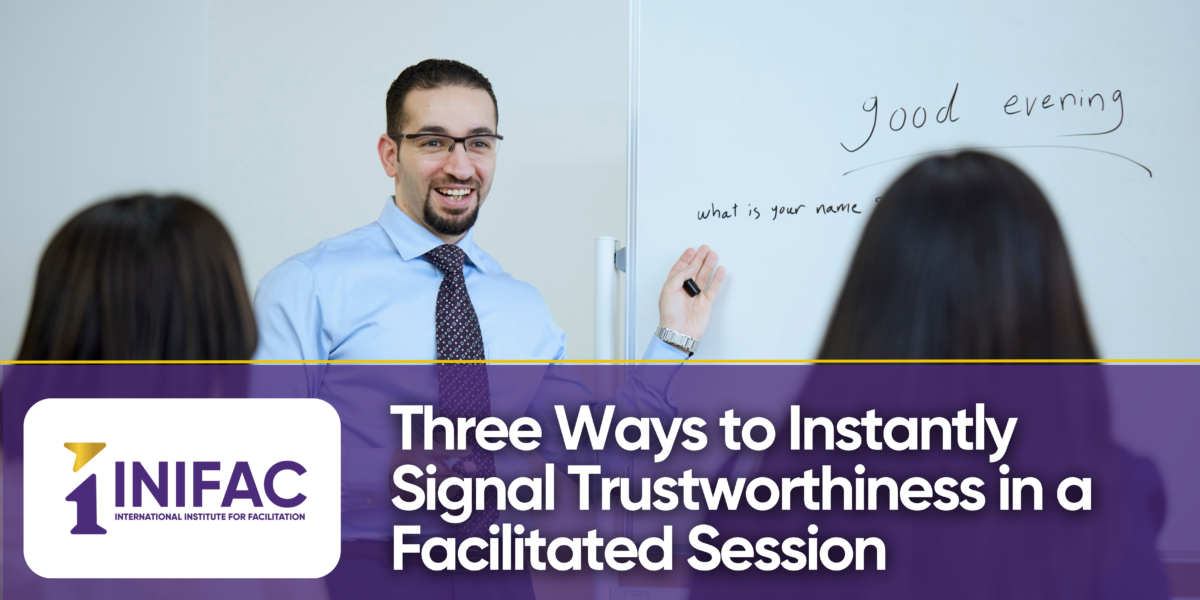
When a group walks into a facilitated session, they are making a significant investment: their time, their ideas, and sometimes their emotional risk. They are putting their trust in you to guide their conversation, ensure neutrality, and help them achieve a meaningful outcome.
But trust isn’t just something you receive during the contracting phase; it’s something you must earn and reinforce throughout every minute of the session. In the heat of discussion, when emotions rise or a discussion stalls, a facilitator’s actions are constantly signaling: Am I worthy of this group’s confidence?
Being worthy of their trust is about more than just a well-designed agenda. It’s about your presence and your commitment to impartial process and measurable progress.
Here are three actionable ways to instantly signal to your participants that you are a trustworthy and effective guide:
1. Master the “Neutral Replay”
When a participant shares an idea, a frustration, or a strong opinion, their immediate concern is, “Did the facilitator actually hear me?” If they sense you’re already crafting a response or rushing to the next topic, trust erodes.
The most effective way to signal deep listening and respect is the Neutral Replay.
How to do it: Immediately after a participant speaks, repeat the essence of their contribution back to them, using neutral language and no interpretation. Use phrasing like: “If I heard you correctly, the core challenge right now is the cross-departmental communication loop. Is that an accurate summary?”
Why it signals trustworthiness: This technique removes your personal bias and ensures clarity. It tells the speaker, “I am focused entirely on your words,” and it tells the entire group, “In this space, every voice is accurately heard before we move on.” It makes every participant feel seen and respected.
2. Process the Tension (Don’t Just Redirect It)
In complex discussions, a moment of high tension—a sharp disagreement, an emotional outburst, or a frustrating silence—can challenge a facilitator. The impulse is often to swiftly redirect back to the agenda or interrupt the tension to restore order.
A trustworthy facilitator signals they are capable of holding the space by processing the tension with the group, not for the group.
How to do it: When the room’s energy shifts, name the dynamic without judgment. You might say: “I notice that we’ve hit a strong point of disagreement on which path to take. That tells me this is a critical, high-stakes decision point for the team.” Or, during a long silence: “There’s a lot of quiet right now. That suggests we may need a moment to process what was just said before we continue the discussion.”
Why it signals trustworthiness: By naming the reality of the room, you show that you are present and objective. You are not afraid of the conflict, and you trust the group to navigate it. You are stepping into the role of a steady, objective anchor, reinforcing their belief that you can help them translate confusion into clarity.
3. Commit to “What Happens Next”
Many sessions end with enthusiasm, only to have the energy dissipate because the next steps are vague or left unresolved. Nothing breaks trust faster than a great discussion that results in no visible progress.
A trustworthy facilitator sees the session through to the edge of action.
How to do it: Dedicate the final 10–15 minutes of any session to creating a crystal-clear commitment map. Every key insight and decision must be tied to an owner and a deadline. Ask the group: “Based on what we just decided, who is going to own drafting the updated policy, and when will that draft be shared with the team?” Use the final few minutes to recap only the Action Items, not the discussion.
Why it signals trustworthiness: This ensures your participants leave the room knowing their time was not wasted. It signals that you are not just a discussion leader, but a progress partner. You honor their investment by ensuring that the work of today becomes the action of tomorrow.
The confidence groups place in us is a profound privilege. By mastering these small, steady actions within the room, we continually reinforce our worthiness of their trust and build the foundation for successful collective work.
